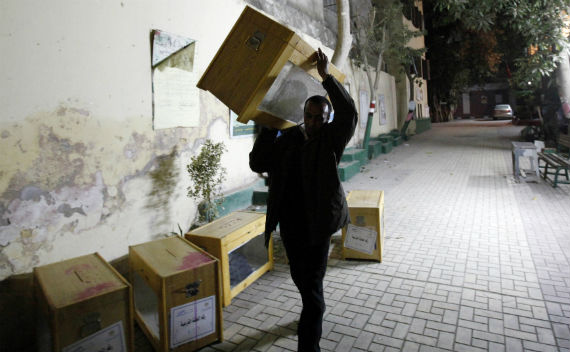Egypt’s Troubling Road to the Ballot Box
More on:

Just as Egypt’s revolution followed Tunisia’s, so too will its election to pick a new parliament that will write a constitution. Egyptians go to the polls for the first round of parliamentary elections November 28. But recent developments reinforce the fears held by many Tahrir Square activists that Egypt’s elections under the watch of the Supreme Council of the Armed Forces (SCAF) will not match internationally recognized standards for elections as just met in Tunisia.
NGOs in Egypt are facing what POMED’s Stephen McInerney calls the “SCAF’s assault on civil society." To be sure, NGOs during the Mubarak era faced strong repression. However, such harsh repression was supposed to improve after January 25, not worsen. As McInerney points out, Mubarak’s government never declared dozens of NGOs to be illegal nor did his government threaten to charge them with crimes based on their registration status—both of which have recently been reported under the stewardship of the SCAF. Well-established nonpartisan American organizations such as Freedom House report that it has experienced “pressure and harassment” by the government since it opened its office in post-revolutionary Egypt. Freedom House now fears that a harsh media campaign—it has been judged illegal by the government owned Al Ahram--presages a possible government shutdown or physical assault against its offices or staff.
Fayza Abul Naga, Egypt’s longstanding Minister of International Cooperation under Mubarak and now the SCAF, has called any foreign funding to non-government approved NGOs “an intervention in our internal affairs.” Justice Minister Abdel Aziz al-Guidhi has said organizations face charges of treason for conspiring against Egypt by sending sensitive information to foreign parties.
Clearly the Obama administration is concerned, as it should be. Doubtlessly reflecting this unease, President Obama called Field Marshall Tantawi on Tuesday. According to a readout issued by the White House, the two leaders agreed that Egypt’s upcoming elections must be free and fair and in accordance with democratic standards. He also rightly urged Egypt to rescind its much-hated emergency law and military trials of civilians.
Curiously, President Obama “welcomed Egypt’s willingness to accept international election witnesses” in the statement. The term “witnesses” rather than “observers” is different, not just linguistically but substantively. Witnesses will not be free to observe the elections in an unfettered manner according to international norms. It is not clear that these witnesses will be officially credentialed, allowed to enter voting places, and observe the complete vote and count as they should be under normal monitoring procedures. With the Egyptian government’s efforts to control, circumscribe, and indeed curtail NGO activity, now is not the time to lower standards for Egypt’s handling of the November ballot. The precedents now set in Egypt will reverberate throughout the entire Arab world for some time to come. It is critical that the election season marks a departure from, rather than continuity with, Egypt’s seriously flawed electoral past.
More on:
 Online Store
Online Store